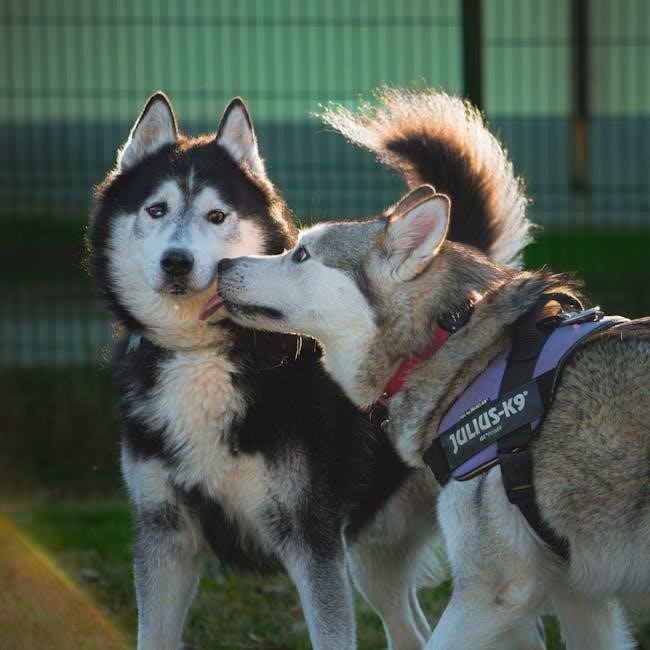Piriton for dogs is a commonly used antihistamine to treat allergic reactions. The dosage chart PDF provides guidelines based on weight, ensuring safe administration under veterinary advice.

What is Piriton?
Piriton is an antihistamine medication containing Chlorphenamine Maleate, primarily used to treat allergic reactions in humans. It is sometimes prescribed for dogs under veterinary guidance, though it lacks an official veterinary license.
Active Ingredient: Chlorphenamine Maleate
Chlorphenamine Maleate is the active ingredient in Piriton, an antihistamine that works by blocking histamine receptors. It is commonly used to relieve allergic reactions in both humans and animals. In dogs, Chlorphenamine Maleate helps reduce symptoms such as itching, swelling, and skin irritation caused by allergies. While Piriton is primarily a human medication, veterinarians often prescribe it off-label for canines. Its effectiveness in treating allergic conditions makes it a popular choice, though dosage must be carefully managed to ensure safety and efficacy for dogs.

When is Piriton Used for Dogs?
Piriton is used to treat allergic reactions in dogs, such as itching, skin irritation, and swelling. It is often prescribed by veterinarians to alleviate symptoms caused by allergies.
Treating Allergic Reactions
Piriton is effective in treating allergic reactions in dogs by blocking histamine, reducing symptoms like itching, swelling, and redness. It’s commonly prescribed for skin allergies, insect bites, and reactions to pollen. Veterinarians recommend Piriton for its ability to provide quick relief and improve a dog’s quality of life. Always follow the dosage guidelines specified by your vet to ensure safe and effective treatment. Regular monitoring is essential to avoid any potential side effects and ensure the best outcome for your dog’s health.
Other Uses in Canines
While Piriton is primarily used to treat allergic reactions in dogs, it can also be beneficial in other situations. Veterinarians may prescribe it to alleviate symptoms of motion sickness or as a mild sedative in anxious dogs. Additionally, Piriton can help manage chronic itching and reduce inflammation in certain skin conditions, providing relief and improving your dog’s comfort. However, it’s important to note that Piriton is not FDA-approved for veterinary use, so always consult your vet for proper guidance and dosage instructions. Consulting a vet is crucial to ensure safe and effective treatment, as incorrect dosages can lead to side effects.

Dosage Guidelines
Dosage guidelines for Piriton in dogs are crucial for safe use. Always consult a veterinarian to determine the correct dose based on your dog’s weight and symptoms.
General Dosage Recommendations
The general dosage of Piriton for dogs is typically based on weight, with a common recommendation of 1 mg per pound every 8-12 hours. This translates to 2 mg per kilogram. For example, a 20-pound dog might receive a 20 mg dose, which could be half of a 40 mg tablet. However, precise dosing should be determined by a veterinarian to ensure safety and efficacy, as individual needs may vary. Always follow veterinary advice and consult a dosage chart PDF for specific guidelines tailored to your dog’s size and condition.
Factors Influencing Dosage
Several factors influence the dosage of Piriton for dogs, including the dog’s weight, size, and the severity of the allergic reaction. The dosage may also vary based on the individual dog’s health status and any pre-existing medical conditions. Additionally, the presence of other medications or supplements being administered can impact the appropriate dose. Veterinarians often adjust the dosage to ensure efficacy while minimizing potential side effects. It’s crucial to follow a dosage chart PDF and consult a vet to determine the most suitable dose for your dog, as incorrect dosing can lead to adverse reactions or reduced effectiveness.

Safety and Precautions
Always follow veterinary advice when administering Piriton to dogs. Monitor for side effects like drowsiness or dry mouth. Use cautiously in puppies or dogs with health issues.
Possible Side Effects
While generally safe, Piriton can cause side effects in dogs. Common issues include drowsiness, dry mouth, and lethargy. In rare cases, it may lead to increased heart rate or appetite changes. Gastrointestinal upset, such as nausea or vomiting, has also been reported. Additionally, some dogs might experience urinary retention or mild confusion. It’s crucial to monitor your dog’s behavior and physical condition after administering Piriton. If severe or persistent side effects occur, consult your veterinarian immediately to adjust the dosage or consider alternative treatments. Always prioritize your dog’s health and safety.
risks and Contraindications
Piriton, while effective for allergies in dogs, carries risks. It is not licensed for veterinary use, making it an off-label medication. Risks include sedation, particularly in older dogs or those with pre-existing medical conditions. Dogs with a history of allergies to chlorphenamine or other antihistamines should avoid Piriton. Additionally, it may worsen conditions like glaucoma or gastrointestinal obstruction. Administering Piriton to dogs with certain health issues, such as heart conditions or epilepsy, requires careful consideration. Always consult your veterinarian before use, especially if your dog is taking other medications, to minimize potential interactions and ensure safe treatment.
Consulting a Veterinarian
Consulting a veterinarian is crucial before giving Piriton to dogs. They will provide personalized advice, ensuring safe and effective use based on your dog’s specific needs and health status.
Importance of Professional Advice
Veterinary advice is essential when administering Piriton to dogs. Since Piriton is a human medication, it lacks an official veterinary license, making professional guidance critical to ensure safety and effectiveness. A vet will assess your dog’s health, weight, and specific condition to determine the appropriate dosage, minimizing risks of adverse effects. They can also monitor for any unexpected reactions and adjust treatment as needed. Without professional input, improper dosing or contraindications could harm your pet, emphasizing the necessity of consulting a vet before use.
Key Questions for Your Vet
When discussing Piriton for your dog, ask your vet about the correct dosage based on your dog’s weight and condition. Inquire about potential side effects to watch for and how to recognize an overdose. Understanding interactions with other medications your dog is taking is crucial. Also, ask for administration tips to ensure your dog takes the medication effectively. Discuss how long the treatment should last and how to monitor its effectiveness. Finally, ask under what circumstances Piriton should be stopped and what alternatives are available if needed. These questions ensure safe and effective treatment for your pet.

Administration Tips
Administer Piriton tablets orally, following the dosage chart PDF from your vet. Ensure accurate dosing based on your dog’s weight. Give with or without food, as directed. If your dog resists, try hiding the tablet in a treat or using a pill pocket. Administer at consistent times daily, as specified by your vet. Monitor and track doses to avoid missing or doubling up. Always follow veterinary guidelines for safe and effective treatment.
How to Give Piriton Tablets
Giving Piriton tablets to your dog should be done carefully to ensure proper administration. Start by preparing the correct dose as per the dosage chart PDF provided by your vet. Offer the tablet directly in your dog’s mouth, ensuring it is swallowed. If your dog resists, you can hide the tablet in a treat or use a pill pocket. Administering with food or water can help ease the process. Always follow the recommended schedule and avoid crushing or splitting the tablets, as this may alter effectiveness. Monitor your dog’s response to the medication and report any concerns to your vet promptly.
Dosage Chart PDF
A reliable dosage chart PDF for Piriton in dogs is available online, providing clear guidelines based on weight and severity of symptoms. Always consult your vet for accuracy.
Locating Reliable Dosage Charts
Reliable dosage charts for Piriton in dogs can be found through trusted veterinary resources or pet health websites. Ensure the source is credible and up-to-date. Veterinary clinics often provide personalized charts based on your dog’s weight and condition. Always consult your vet for accuracy, as generic charts may not account for individual needs. Printable PDF versions are available online, but verify the information aligns with professional veterinary advice. Avoid unverified sources to prevent incorrect dosages, which could harm your pet. A reliable chart will include weight ranges, recommended doses, and administration frequency.
Alternatives and Supplements
For dogs requiring antihistamines, alternatives like Zyrtec or Telfast may be recommended. Natural supplements, such as omega-3 fatty acids or coconut oil, can also support skin health. Always consult a vet before trying new treatments. These options may complement Piriton or serve as substitutes if needed. Ensure any supplement aligns with your dog’s specific health conditions. Combining treatments should only occur under professional guidance to avoid adverse reactions. Natural remedies can be effective, but they should not replace prescribed medications without veterinary approval. Always prioritize your dog’s safety and health when exploring alternative solutions.

When to Stop Piriton
Your veterinarian may advise stopping Piriton if side effects occur or if it proves ineffective. Discontinue use if your dog experiences severe allergic reactions or unusual symptoms. Stop administration if your dog’s condition worsens or fails to improve. Consult your vet immediately if you notice adverse effects like excessive drowsiness or breathing difficulties. Piriton should only be paused or discontinued under professional guidance to ensure your dog’s safety and well-being. Always follow your vet’s instructions regarding cessation of treatment.
Piriton can be an effective treatment for dogs with allergic reactions when used correctly. Always consult a veterinarian before administering Piriton to ensure safety and proper dosage. The dosage chart PDF serves as a helpful guide, but professional advice is essential. Monitor your dog for side effects and adjust treatment as needed. By following these guidelines, you can help your dog manage allergies safely. Remember, your veterinarian’s expertise is crucial for your dog’s health and well-being when using Piriton or any medication.
